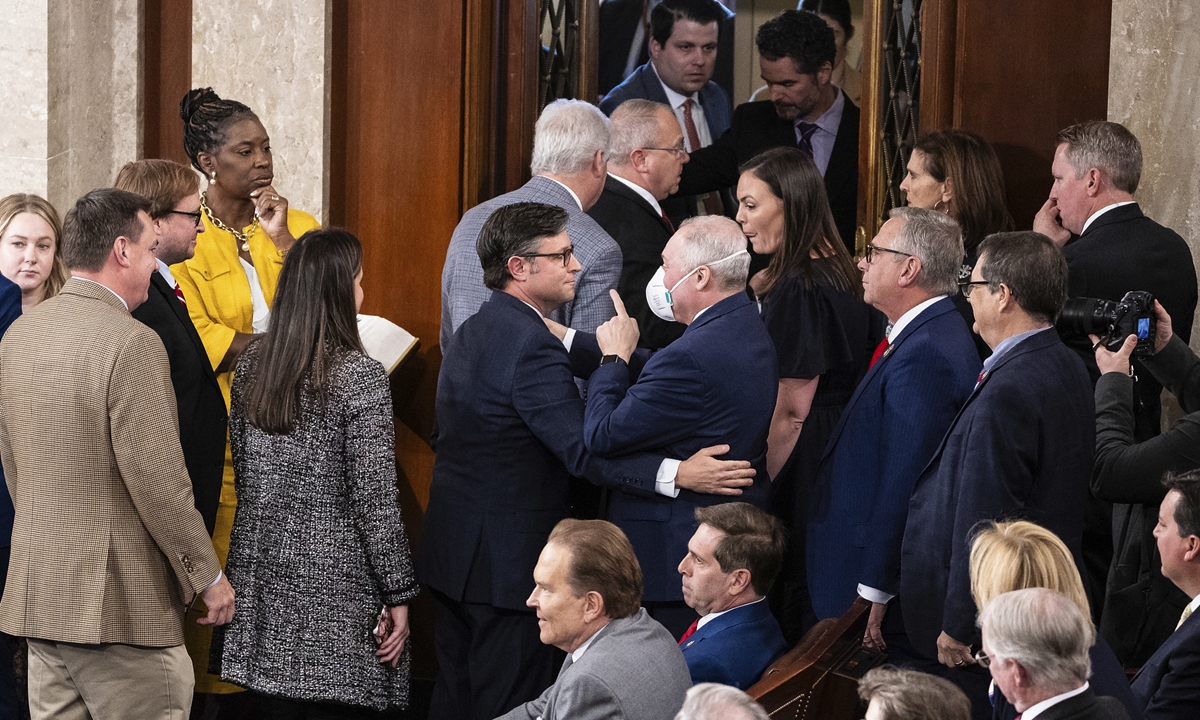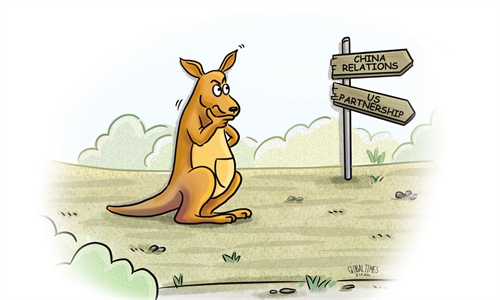
US House Speaker Mike Johnson is congratulated by House Majority Leader Steve Scalise after being elected on the House floor at the US Capitol October 25, 2023. Photo: VCG
After three weeks without a speaker in the House following the ousting of Kevin McCarthy, Republican House Representative Mike Johnson of Louisiana was elected as the new speaker on Wednesday local time.
On the same day, a mass shooting occurred in Lewiston, Maine, which killed at least 18 people. The massacre is one of the deadliest in the US in recent years. Chinese analysts said on Thursday that the US domestic political and security situation is still worrisome and the power struggle between Democrats and Republicans will add uncertainties to US internal and external policies.
Chinese experts on US studies said Johnson's election will expand fiscal conservatism in the House, making it more difficult for President Joe Biden and his administration to reach agreement with the Republicans on issues such as supporting Ukraine and avoiding another shutdown, while the House will be more assertive in helping Donald Trump in the 2024 presidential election and prevent him from being harmed by legal investigations launched by Democrats.
As someone with a hardline stance against China and a member of the "Congressional Taiwan Caucus" that supports "Taiwan secessionism," Johnson could be more aggressive than his predecessors in adding challenges to China-US relations, said analysts.
Some observers also raised concerns that the US House speaker's attitude toward China became worse from Nancy Pelosi and Kevin McCarthy and will continue to do so with Mike Johnson, reflecting a poisoned political atmosphere in the US, which is a problem that the US side should overcome if it wants to better manage US-China relations and ease bilateral tensions.
Johnson secured the gavel without losing any GOP votes. The final tally was 220 votes for Johnson and 209 for House Minority Leader Hakeem Jeffries, US media reported. According to CNN, "Johnson is a Trump ally." The speaker was a key congressional figure in the failed efforts to overturn the 2020 election for former President Donald Trump. He sent an email from a personal account in 2020 to every House Republican soliciting signatures for an amicus brief in the long-shot Texas lawsuit seeking to invalidate electoral college votes from multiple states.
Lü Xiang, an expert on US studies and research fellow at the Chinese Academy of Social Sciences, told the Global Times on Thursday that it is certain Republicans in the House will be more united and make more efforts to guard Trump's campaign and help the former president overcome the challenges of legal investigations launched by Democrats. "This means the struggle between the two parties won't be eased, but will get more intense."
Johnson now faces pressing issues, CNN's report said, including a potential shutdown. Government funding is set to expire on November 17, and the GOP-controlled House will need to work with the Democratic-led Senate to avert it, while lawmakers must also consider aid to Ukraine and Israel.
The crisis of a government shutdown still exists, and with the latest deadly shooting in Maine, the struggle between the two parties on long-standing issues such as gun control are likely to further tear American society apart, experts said.
"Johnson and Republicans in the House will keep pressuring the Biden administration to reduce support for Ukraine, especially with the situation in Gaza and the need from Israel for military and economic support. Johnson will pressure Biden to be more assertive in defending Israel's war against Gaza," Lü noted.
According to the VOA, Johnson is an obvious "China hawk" in the House, as he holds a hostile stance on China in the fields of the Taiwan Straits, COVID-19 and sanctions against Chinese officials.
However, China-US relations might see some major new changes in the coming weeks, as the APEC meeting will be held in San Francisco next month, so to what extent the Republicans and the newly elected speaker will impact the US' policy toward China remains in question, Li Haidong, a professor at the China Foreign Affairs University, told the Global Times on Thursday.




